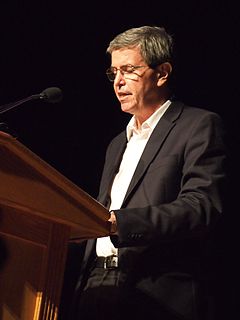Top 1004 Relative Quotes & Sayings - Page 17
Explore popular Relative quotes.
Last updated on April 21, 2025.
For African American children, in particular, the odds are extremely high that they will have a parent or loved one, a relative, who has either spent time behind bars or who has acquired a criminal record and thus is part of the under-caste - the group of people who can be legally discriminated against for the rest of their lives. For many African American children, their fathers, and increasingly their mothers, are behind bars. It is very difficult for them to visit. Many people are held hundreds or even thousands of miles away from home.
Modern man, seeking a middle position in the evaluation of sense impression and thought, can, following Plato , interpret the process of understanding nature as a correspondence, that is, a coming into congruence of pre-existing images of the human psyche with external objects and their behaviour. Modern man, of course, unlike Plato , looks on the pre-existent original images also as not invariable, but as relative to the development of a conscious point of view, so that the word "dialectic" which Plato is fond of using may be applied to the process of development of human knowledge.
A belief in moral absolutes should always make us more, not less, critical of both sides in any conflict. This doesn't mean that both sides are equally wrong; it means that since we all fall short of moral perfection, even the side whose cause is truly righteous may commit terrible acts of violence in defense of that cause -- and, worse, may feel quite justified in committing them. That is the difference between being righteous and being self-righteous. Moral standards are absolute; but human fidelity to them is always relative.
Questions like, "Is my suit OK?", or "Is my job performance satisfactory?", are impossible to think about in the absence of a suitable frame of reference. For an interview suit to serve its purpose, it must make you look good relative to other candidates for the job you want. For your job performance to be satisfactory, it must compare favorably with the performance of others who want the same promotion you do. As Charles Darwin saw clearly, much of life is graded on the curve, and conventional economic models completely ignore that fact.
There is some rationale backing Kim Jong-un's actions, which are survival - survival for his regime, survival for his country. And he has watched, I think, what has happened around the world relative to nations that possess nuclear capabilities and the leverage they have, and seen that having the nuclear card in your pocket results in a lot of deterrence capability. The lessons that we learned out of Libya giving up its nukes and Ukraine giving up its nukes is, unfortunately, if you have nukes, never give them up.
For the machine meant the conquest of horizontal space. It also meant a sense of that space which few people had experienced before – the succession and superimposition of views, the unfolding of landscape in flickering surfaces as one was carried swiftly past it, and an exaggerated feeling of relative motion (the poplars nearby seeming to move faster than the church spire across the field) due to parallax. The view from the train was not the view from the horse. It compressed more motifs into the same time. Conversely, it left less time in which to dwell on any one thing.
It is the duty of all Nations to acknowledge the providence of Almighty God,. to obey his will, to be grateful for his benefits , and humbly to implore his protection and favor... beseech Him to pardon our national and other transgressions; to enable us all, whether in public or private stations, to perform our several and relative duties properly and punctually to render our National Government a blessing to all the people by constantly being a Government of wise, just, and constitutional laws, discreetly and faithfully executed and obeyed
The real question is whether we can learn anything from our experiences upon which we may grow and help others to grow in the likeness and image of God. We know that if we rebel against doing that which is reasonably possible for us, then we will be penalized. And we will be equally penalized if we presume in ourselves a perfection that simply is not there. Apparently, the course of relative humility and progress will have to lie somewhere between these extremes. In our slow progress away from rebellion, true perfection is doubtless several millennia away
The risk of developing carcinoma of the lung increases steadily as the amount smoked increases. If the risk among non-smokers is taken as unity and the resulting ratios in the three age groups in which a large number of patients were interviewed (ages 45 to 74) are averaged, the relative risks become 6, 19, 26, 49, and 65 when the number of cigarettes smoked a day are 3, 10, 20, 35, and, say, 60-that is, the mid-points of each smoking group. In other words, on the admittedly speculative assumptions we have made, the risk seems to vary in approximately simple proportion with the amount smoked.
Now is the moment in the timetable of the Lord to carry the gospel farther than it has ever been carried before.... Many a person in this world is crying, knowingly and unknowingly, 'Come over ... and help us.' He might be your neighbor. She might be your friend. He might be a relative. She might be someone you met only yesterday. But we have what they need. Let us take new courage from our studies and pray, as did Peter, 'And now, Lord, ... grant unto thy servants, that with all boldness they may speak thy word'
I remember my parents yelling at each other and at me from an early age, and I remember a lot of things smashing. I try to look for the happy memories from the brief time my parents were married, and I can't really recall that. From the start things were messed up, and I just kept moving through the years and trying to pick out the little bits of evidence that would help me prove to myself that it wasn't my doing. But it took finding out somebody really does love me, who's not my parents or a relative, to really know that I was loveable.
I find focusing clearly on the problem is the first step to seeing a solution. The problem is (a) the insane amount of time spent raising money from (b) a freakishly tiny proportion of America. Basically .05% are the "relevant funders" of campaigns, meaning candidates can't help but be overly sensitive to the views of that tiny fraction relative to the rest of us. IF that's the problem, THEN the solution is to spread the funders out: to increase the range of us who are the relevant funders of elections, through schemes like vouchers or coupons given to every voter.
As long as we try to project from the relative and conditioned to the absolute and unconditioned, we shall keep the pendulum swinging between dogmatism and skepticism. The only way to stop this increasingly tiresome pendulum swing is to change our conception of what philosophy is good for. But that is not something which will be accomplished by a few neat arguments. It will be accomplished, if it ever is, by a long, slow process of cultural change - that is to say, of change in common sense, changes in the intuitions available for being pumped up by philosophical arguments.
It is important to understand what I mean by semiosis. All dynamic action, or action of brute force, physical or psychical, either takes place between two subjects, whether they react equally upon each other, or one is agent and the other patient, entirely or partially, or at any rate is a resultant of such actions between pairs. But by "semiosis" I mean, on the contrary, an action, or influence, which is, or involves, a cooperation of three subjects, such as a sign, its object, and its interpretant, this tri-relative influence not being in any way resolvable into actions between pairs.
Man was destined for society. His morality therefore was to be formed to this object. He was endowed with a sense of right and wrong merely relative to this. This sense is as much a part of his nature as the sense of hearing, seeing, feeling; it is the true foundation of morality... The moral sense, or conscience, is as much a part of man as his leg or arm. It is given to all human beings in a stronger or weaker degree, as force of members is given them in a greater or less degree. It may be strengthened by exercise, as may any particular limb of the body.
There's an evidence from a number of studies which show that where you grow up and the age at which you move to the suburbs or to a neighborhood that in general seems to have better conditions can really affect a child's outcomes. The kids who moved at young ages are dramatically better as adults. They're earning 30 percent more, they're 27 percent more likely to go to college, relative to the kids who stayed in the high poverty public housing projects. And so there's clear scientific evidence that you can change kids' outcomes just based on where they grow up.
The Art of Success . . . Success is ninety-nine percent mental attitude. It calls for love, joy, optimism, confidence, serenity, poise, faith, courage, cheerfulness, imagination, initiative, tolerance, honesty, humility, patience, and enthusiasm. . . . Success is having the courage to meet failure without being defeated. It is refusing to let present loss interfere with your long-range goal. . . . Success is relative and individual and personal. It is your answer to the problem of making your minutes, hours, days, weeks, months, and years add up to a great life.
A belief is only a thought that you keep thinking. So as you keep thinking this thought, you keep vibrationally attracting relative to that thought. So you confirm your own beliefs again and again and again and again and again. That's why someone who believes in cancer can confirm that belief, or someone who believes in robbery can confirm that belief. So everything is a sort of confirmation of belief.
If you had to explain America's economic success with one word, that word would be "education".... Until now, the results of educational neglect have been gradual - a slow-motion erosion of America's relative position. But things are about to get much worse, as the economic crisis ... deals a severe blow to education across the board.... We need to wake up and realize that one of the keys to our nation's historic success is now a wasting asset. Education made America great; neglect of education can reverse the process.
The relative ease of most driving lures us into thinking we can get away with doing other things. Indeed, those other things, like listening to the radio, can help when driving itself is threatening to cause fatigue. But we buy into the myth of multitasking with little actual knowledge of how much we can really add in or, as with the television news, how much we are missing. As the inner life of the driver begins to come into focus, it is becoming clear not only that distraction is the single biggest problem on the road but that we have little concept of just how distracted we are.
There is a connection between environment and stress on both ends, with excessive clutter and excessive attention to detail both holding the power to distract us from our ability to love fully, work productively and relax effectively. So, what makes sense to me is for each of us to think this through on a few fronts: what constitutes a comfortable environment for us, how much effort we're willing to put into it relative to other priorities, and how well-matched we need our partners' preferences to be to ours.
In a dispassionate comparison of the relative values of human and robotic spaceflight, the only surviving motivation for continuing human spaceflight is the ideology of adventure. But only a tiny number of Earth's six billion inhabitants are direct participants. For the rest of us, the adventure is vicarious and akin to that of watching a science fiction movie. At the end of the day, I ask myself whether the huge national commitment of technical talent to human spaceflight and the ever-present potential for the loss of precious human life are really justifiable.
The relative freedom which we enjoy depends of public opinion. The law is no protection. Governments make laws, but whether they are carried out, and how the police behave, depends on the general temper in the country. If large numbers of people are interested in freedom of speech, there will be freedom of speech, even if the law forbids it; if public opinion is sluggish, inconvenient minorities will be persecuted, even if laws exist to protect them.
Mother Earth is the spirit of the Earth. Amaterasu is the spirit of the Sun, that is, the feminine aspect of the spirit of the Sun. The Sun is a male, but everything is polarized, everything has a male and a female part. And she is the feminine part of light. Relative to the Earth it is more of a male energy, but she is the energy that comes and moves through Mother Earth, to bring consciousness and life.
All parents want to send their children to the best possible schools. But because a good school is a relative concept, a family cannot achieve its goal unless it outbids similar families for a house in a neighborhood served by such a school. Failure to do so often means having to send your kids to a school with metal detectors at the front entrance and students who score in the 20th percentile in reading and math. Most families will do everything possible to avoid having to send their kids to a school like that. But because of the logic of musical chairs, they're inevitably frustrated.
War is like a game of chess ... but with this little difference, that in chess you may think over each move as long as you please and are not limited for time, and with this difference too, that a knight is always stronger than a pawn, and two pawns are always stronger than one, while in war a battalion is sometimes stronger than a division and sometimes weaker than a company. The relative strength of bodies of troops can never be known to anyone.... Success never depends, and never will depend, on position, or equipment, or even on numbers, and least of all on position.
Happy," I muttered, trying to pin the word down. But it is one of those words, like Love, that I have never quite understood. Most people who deal in words don’t have much faith in them and I am no exception – especially the big ones like Happy and Love and Honest and Strong. They are too elusive and far to relative when you compare them to sharp, mean little words like Punk and Cheap and Phony. I feel at home with these, because they’re scrawny and easy to pin, but the big ones are tough and it takes either a priest or a fool to use them with any confidence.
People who live in states have as a rule never experienced the state of nature and vice-versa, and have no practical possibility of moving from the one to the other ... On what grounds, then, do people form hypotheses about the relative merits of state and state of nature? ... My contention here is that preferences for political arrangements of society are to a large extent produced by these very arrangements, so that political institutions are either addictive like some drugs, or allergy-inducing like some others, or both, for they may be one thing for some people and the other for others.
I could give you absolutely sterling advice on how to avoid writing, how when you run out of things to do other than going to your desk and writing, when every closet is reorganized and you've called your oldest living relative twice in one day to see what she's up to and there isn't an unanswered e-mail left on your computer or you simply can't bear to answer another one and there is no dignity, not a drop left, in any further evasion of the task at hand, namely writing, well, you can always ask your dentist for a root canal or have an accident in the bathtub instead.
It may be quite true that some negroes are better than some white men; but no rational man, cognisant of the facts, believes that the average negro is the equal, still less the superior, of the average white man. And, if this be true, it is simply incredible that, when all his disabilities are removed, and our prognathous relative has a fair field and no favour, as well as no oppressor, he will be able to compete successfully with his bigger-brained and smaller-jawed rival, in a contest which is to be carried on by thoughts and not by bites.
What then is to be the lot of Rossetti's fame and influence? 'An amateur who failed in two arts', it is true; yet it hardly harms Rossetti or touches his standing. On the contrary, it defines both very brilliantly. The small word 'failed' is a small word and little more to artists who are forever going on until they give up over a game that must be lost. Every artist, when confronted by the immensities of art, which is life, must confess to failure. A failure is a thing very relative.
Our initial sensory data are always "first derivatives," statements about differences which exist among external objects or statements about changes which occur either in them or in our relationship to them. Objects and circumstances which remain absolutely constant relative to the observer, unchanged either by his own movement or by external events, are in general difficult and perhaps always impossible to perceive. What we perceive easily is difference and change and difference is a relationship.
The personal computer was a disruptive innovation relative to the mainframe because it enabled even a poor fool like me to have a computer and use it, and it was enabled by the development of the micro processor. The micro processor made it so simple to design and build a computer that IB could throw in together in a garage. And so, you have that simplifying technology as a part of every disruptive innovation. It then becomes an innovation when the technology is embedded in a different business model that can take the simplified solution to the market in a cost-effective way.
What the new fertilizer technology has accomplished for the farmer is clear: more crop can be produced on less acreage than before. Since the cost of fertilizer, relative to the resultant gain in crop sales, is lower than that of any other economic input, and since the Land Bank pays the farmer for acreage not in crops, the new technology pays him well. The cost-in environmental degradation-is borne by his neighbors in town who find their water polluted. The new technology is an economic success-but only because it is an ecological failure.
Above a certain level of income, the relative value of material consumption vis-a-vis leisure time is diminished, so earning a higher income at the cost of working longer hours may reduce the quality of your life. More importantly, the fact that the citizens of a country work longer than others in comparable countries does not necessarily mean that they like working longer hours. They may be compelled to work long hours, even if they actually want to take longer holidays.
Therefore the solid body of the earth is reasonably considered as being the largest relative to those moving against it and as remaining unmoved in any direction by the force of the very small weights, and as it were absorbing their fall. And if it had some one common movement, the same as that of the other weights, it would clearly leave them all behind because of its much greater magnitude. And the animals and other weights would be left hanging in the air, and the earth would very quickly fallout of the heavens. Merely to conceive such things makes them appear ridiculous.
I'm actually cautiously optimistic that Donald Trump will be so bad that he will force America to wake up and realise that forcing America to vote for right wing Republicans is always a terrible idea. It's never been a good idea, but what happened here is you have a president like Obama who gives you eight years of relative stability and prosperity, and people forget that Republicans are just terrible, not just for the country but for the planet. Maybe this is America's equivalent of bottoming out, like a crystal meth addict going on one last big run before they have to get sober.
Historians will look back on this era and how the Internet changed what we value, what we consider art, the way we think, the way we define what it means to be human. In Sincerity and Authenticity, Lionel Trilling describes the changes that occurred between about 1850 and 1920, due to the Industrial Revolution and the resulting migration of people from small communities to relative anonymity in cities. Because of that paradigm shift, ideas about what it means to be an individual underwent a transformation that leeched into all areas. Art, psychology, history, marriage, gender.
so my grandmother was not without humanity. and if she wore cocktail dresses when she labored in the garden, they were cocktail dresses she no longer intended to wear to cocktail parties. even in her rose garden she did not want to appear underdressed. if the dresses got too dirty from gardening, she threw them out. when my mother suggested to her that she might have them cleaned, my grandmother said, "what? and have those people at the cleaners what i was doing in a dress to make it that dirty?" from my grandmother i learned that logic is relative.
Determinism is the thesis that is true at every moment that the way things then are determines a unique future, that only one of the alternative futures that may exist relative to a given moment is a physically possible continuation of the state of things at the moment. Or, if you like, we may say that determinism is the thesis that only one continuation of the state of things at a given moment is consistent with the laws of nature.
Most people, including ourselves, live in a world of relative ignorance. We are even comfortable with that ignorance, because it is all we know. When we first start facing truth, the process may be frightening, and many people run back to their old lives. But if you continue to seek truth, you will eventually be able to handle it better. In fact, you want more! It's true that many people around you now may think you are weird or even a danger to society, but you don't care. Once you've tasted the truth, you won't ever want to go back to being ignorant
It is not given to man to know the whole Truth. His duty lies in living up to the truth as he sees it, and in doing so, to resort to the purest means, i.e., to non-violence. God alone knows absolute truth. Therefore, I have often said, Truth is God. It follows that man, a finite being, cannot know absolute truth. Nobody in this world possesses absolute truth. This is God's attribute alone. Relative truth is all we know. Therefore, we can only follow the truth as we see it. Such pursuit of truth cannot lead anyone astray.
When I read the documents relative to the Modernism, as it was defined by Saint Pius X, and when I compare them to the documents of the II Vatican Council, I cannot help being bewildered. For what was condemned as heresy in 1906 was proclaimed as what is and should be from now on the doctrine and method of the Church. In other words, the modernists of 1906 were, somewhat, precursors to me. My masters were part of them. My parents taught me Modernism. How could Saint Pius X reject those that now seem to be my precursors?
People need to understand. If they go to a show on Broadway and find seventy people working but only fifty spectators, how much would the ticket cost? That's what El Bulli's about. There are seventy actors who are playing for just fifty spectators. Is the price expensive? It's relative. How much does a normal dinner at a five-star hotel restaurant cost? Four hundred dollars. It's the same as El Bulli. But you can also think of it this way: How much would it cost to eat something that nobody else is eating?










































